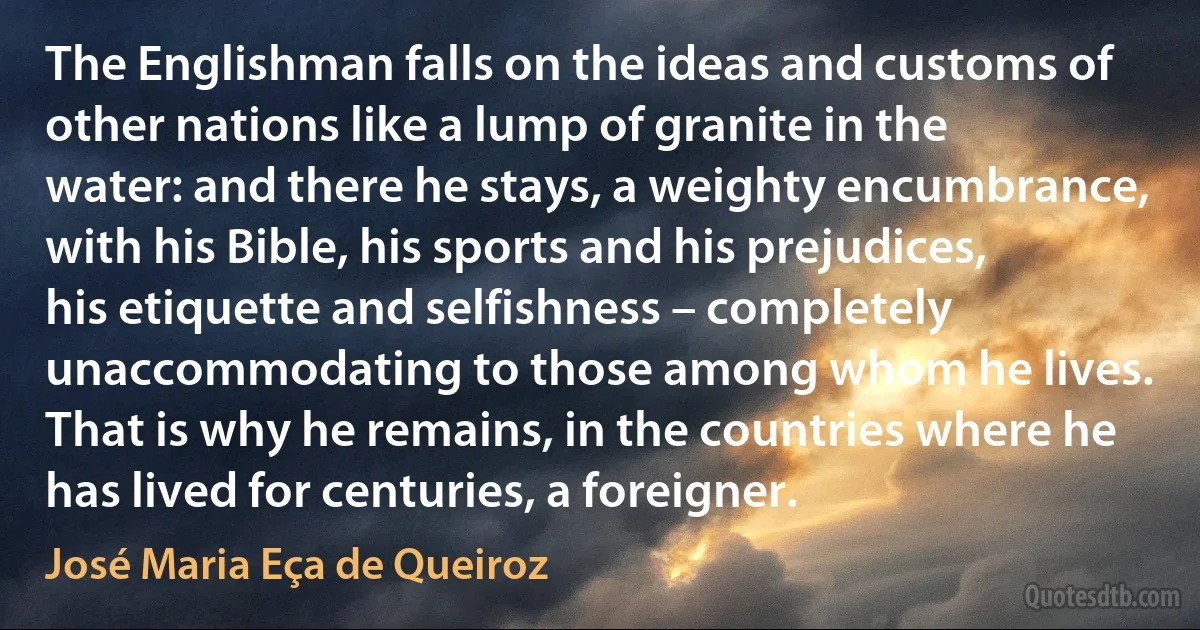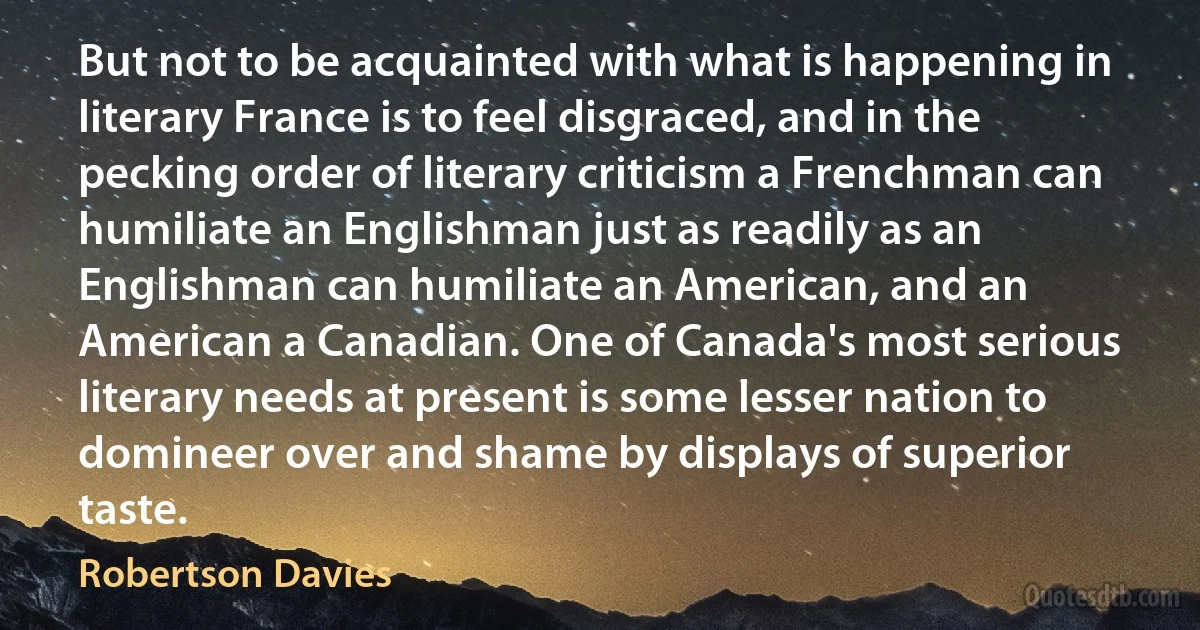Englishman Quotes - page 4
Here is a decent, ordinary fellow Englishman, who in broad daylight in my own town says to me, his Member of Parliament, that his country will not be worth living in for his children. I simply do not have the right to shrug my shoulders and think about something else. What he is saying, thousands and hundreds of thousands are saying and thinking – not throughout Great Britain, perhaps, but in the areas that are already undergoing the total transformation to which there is no parallel in a thousand years of English history.

Enoch Powell
Well, our forefathers abolished this system [of monopolies]; at a time, too, mark you, when the sign manual of the sovereign had somewhat of a divine sanction and challenged superstitious reverence in the minds of the people. And shall we, the descendants of those men, be found so degenerate, so unworthy of the blood that flows in our veins, so recreant to the very name 'Englishman,' as not to shake off this incubus, laid on as it is by a body of our fellow-citizens? ... We advocate the abolition of the Corn Law because we believe that to be the foster-parent of all other monopolies; and if we destroy that-the parent, the monster monopoly-it will save us the trouble of devouring the rest.

Richard Cobden
There is the concealment of truth, which has to be resorted to so as to prevent anything to the credit of the enemy reaching the public. A war correspondent who mentioned some chivalrous act that a German had done to an Englishman during an action received a rebuking telegram from his employer: "Don't want to hear about any good Germans"; and Sir Philip Gibbs, in Realities of War, says: "At the close of the day the Germans acted with chivalry, which I was not allowed to tell at the time."

Arthur Ponsonby
Mister Gladstone is an Englishman and a scholar. Had he walked by the side of that soldier, remembering Cromwell's Ironsides who trusted in God and kept their powder dry, and the old Continental militia, I think he would not have declared as he did that 'Jefferson Davis had created a nation', but he would rather have said, 'If Bunker Hill sends the first soldiers to this war, it is already decided. My lords and gentlemen, John Bull had better touch no American bonds which Bunker Hill does not endorse.

George William Curtis
I told the Englishman that my alma mater was books, a good library. Every time I catch a plane, I have with me a book that I want to read-and that's a lot of books these days. If I weren't out here every day battling the white man, I could spend the rest of my life reading, just satisfying my curiosity-because you can hardly mention anything I'm not curious about.

Malcolm X
Unity and Uniformity were the whole motive of philosophy, and if Darwin, like a true Englishman, preferred to back into it - to reach God a posteriori - rather than start from it, like Spinoza, the difference of method taught only the moral that the best way of reaching unity was to unite. Any road was good that arrived.

Henry Adams
The English mind was like the London drawing room, a comfortable and easy spot, filled with bits and fragments of incoherent furnitures, which were never meant to go together, and could be arranged in any relation without making a whole, except by the square room. Philosophy might dispute about innate ideas till the stars died out in the sky, but about innate tastes no one, except perhaps a collie-dog, has the right to doubt; least of all the Englishman, for his tastes are his being; he drifts after them as unconsciously as a honey-bee drifts after his flowers.

Henry Adams
If there was in all France, between 1140 and 1200, a more typical Englishman of the future Church of England type than John of Salisbury, he has left no trace; and John wrote a description of his time which makes a picturesque contrast with the picture painted by Abélard, his old master, of the century at its beginning. John weighed Abélard and the Schools against Bernard and the Cloister, and coolly concluded that the way to truth lay rather through Citeaux, which brought him to Chartres as Bishop in 1176, and to a mild scepticism in faith. "I prefer to doubt," he said, "rather than rashly define what is hidden."

Henry Adams
Propose to any Englishman any principle, or any instrument, however admirable, and you will observe that the whole effort of the English mind is directed to find a difficulty, a defect, or an impossibility in it. If you speak to him of a machine for peeling a potato, he will pronounce it impossible; if you peel a potato with it before his eyes, he will declare it useless because it will not slice a pineapple. Impart the same principle or show the same machine to an American or to one of our Colonists and you will observe that the whole effort of his mind is to find some new application of the principle, some new use for the instrument.

Charles Babbage
The suggestion that words are symbols for things, actions, qualities, relationships, et cetera, is naive, a gross simplification. Words are slippery customers. The full meaning of a word does not appear until it is placed in its context, and the context may serve an extremely subtle function -- as with puns, or double entendre. And even then the "meaning" will depend upon the listener, upon the speaker, upon their entire experience of language, upon their knowledge of one another, and upon the whole situation. Words do not "mean things" in a one-to-one relation like a code. Words, too, are empirical signs, not copies or models of anything; truly, onomatopoeia and gestures frequently seem to possess resemblance, but this resemblance does not bear too close examination. A cockerel may seem to say cook-a-doodle-do to an Englishman, but a German thinks it says kikeriki, and a Japanese kokke-kekko. Each can paint only with the phonetic sound of his own language.

Colin Cherry
There is a grim and ghastly humor -- the humor that is born of a pathetic philosophy -- which now and then strikes me in reading the bright and keen-witted work of our American paragraphers. It is a humor that may be crystallized by hunger and sorrow and tears. It is not found elsewhere as it is in America. It is out of the question in England, because an Englishman cannot poke fun at himself. He cannot joke about an empty flour-barrel. We can: especially if by doing it we may swap the joke for another barrel of flour. We can never be a nation of snobs so long as we are willing to poke fun at ourselves.

Edgar Wilson Nye
The Englishman, in eleven years, gets three bushels more of wheat than the Frenchman. He gets three crops of barley, tares, or beans, which produce nearly twice as many bushels per acre, as what the three French crops of spring corn produce. And he farther gets, at the same time, three crops of turnips and two of clover, the turnips worth 40s. the acre, and the clover 60s. that is 12l. for both. What an enormous superiority! More wheat; almost double of the spring corn; and above 20s. per acre per annum in turnips and clover. But farther; the Englishman's land, by means of the manure arising from the consumption of the turnips and clover is in a constant state of improvement, while the Frenchman's farm is stationary.

Arthur Young



